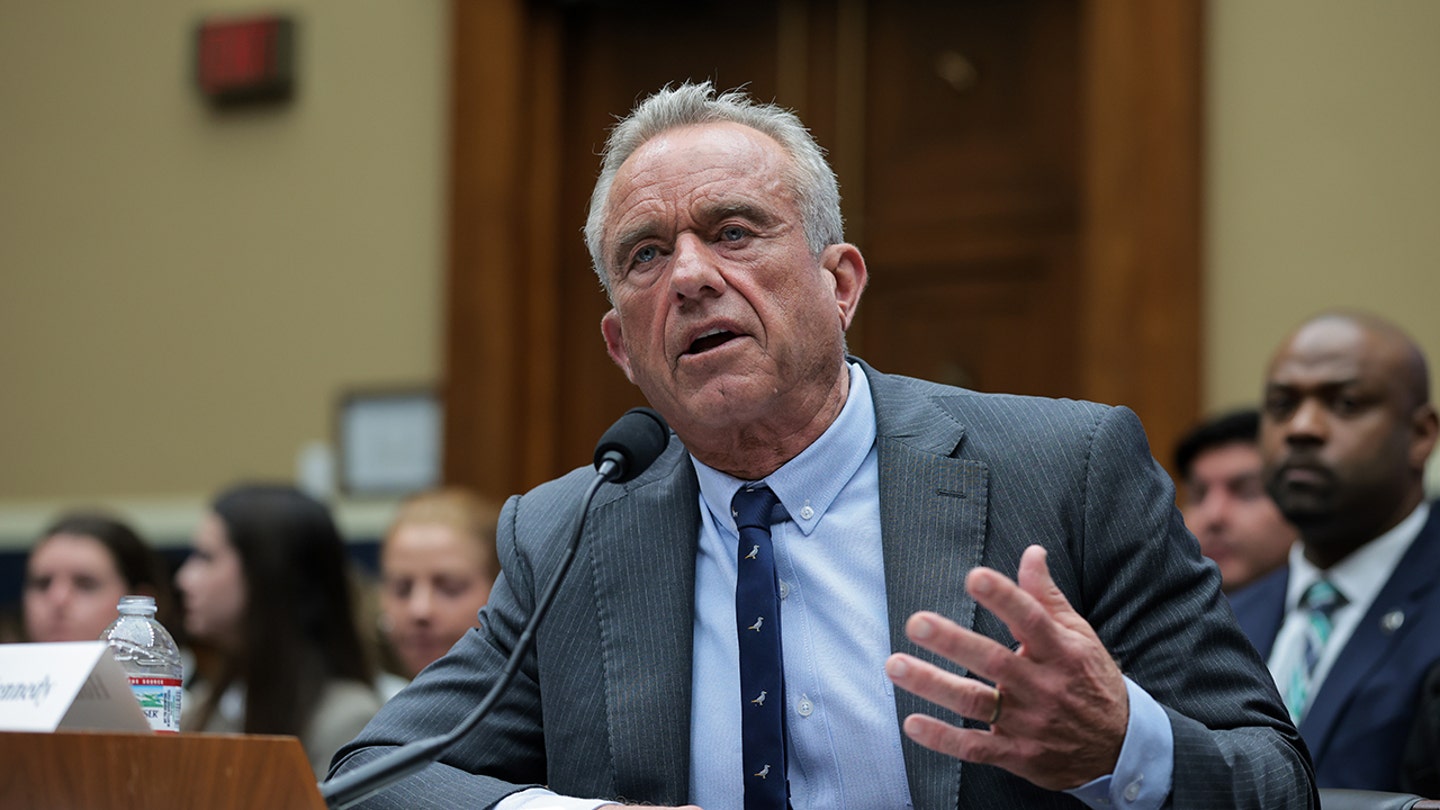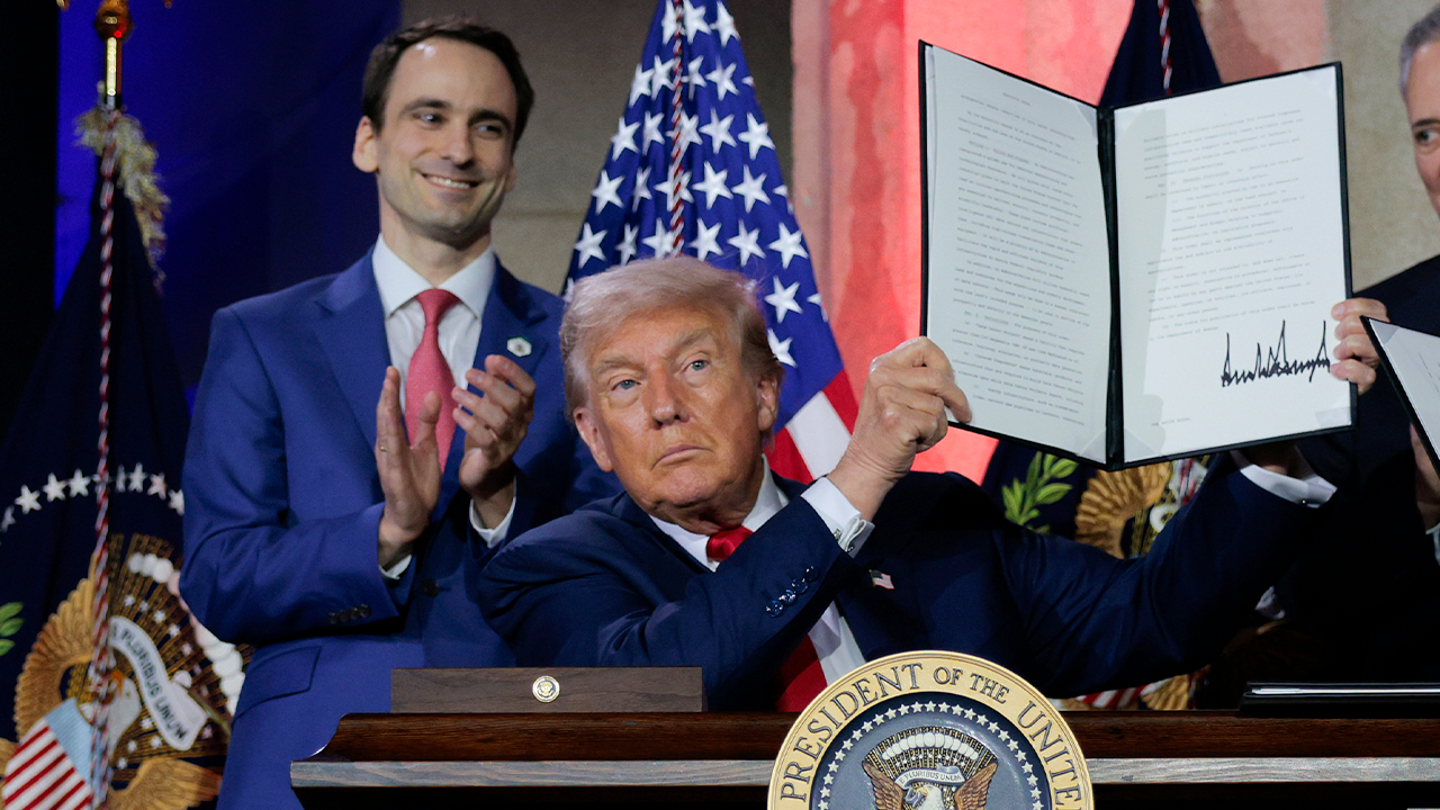
Democratic states sue to force Trump to hand over crime grant money in immigration fight
Entities mentioned:
- Trump administration: Control, Power, Influence
- Democratic states: Justice, Righteousness, Indignation
- Justice Department: Control, Duty, Influence
- Immigration and Customs Enforcement (ICE): Duty, Control, Security
- Rob Bonta: Justice, Moral outrage, Duty
- Pam Bondi: Duty, Loyalty, Control
Article Assessment:
Credibility Score: 75/100
Bias Rating: 40/100 (Lean Left)
Sentiment Score: 30/100
Authoritarianism Risk: 65/100 (Authoritarian Tendencies)
Bias Analysis:
The article leans slightly left, primarily due to its focus on Democratic states' perspective and use of terms like 'brazen attempt' and 'strong-arm'. However, it does present some factual information about the administration's actions.
Key metric: Immigration Enforcement Effectiveness
As a social scientist, I analyze that this article highlights a significant conflict between federal and state governments over immigration policy and funding allocation. The Trump administration's attempt to leverage crime victim support funds to enforce immigration policies demonstrates a contentious approach to federal-state relations. This conflict could potentially impact the effectiveness of both immigration enforcement and victim support programs. The lawsuit by Democratic states represents a pushback against what they perceive as federal overreach, emphasizing the tension between state autonomy and federal immigration priorities. This situation may lead to decreased cooperation between state and federal agencies, potentially reducing overall immigration enforcement effectiveness while also risking the stability of crime victim support programs.

US State Department has revoked more than 6,000 student visas, official says
Entities mentioned:
- State Department: Security, Control, Duty
- Trump administration: Security, Control, Nationalism
- Rumeysa Ozturk: Freedom, Justice, Self-preservation
- Marco Rubio: Loyalty, Security, Righteousness
- NAFSA: Association of International Educators: Professional pride, Concern, Influence
Article Assessment:
Credibility Score: 75/100
Bias Rating: 55/100 (Center)
Sentiment Score: 30/100
Authoritarianism Risk: 65/100 (Authoritarian Tendencies)
Bias Analysis:
The article presents multiple perspectives, including government officials and educational organizations. While it leans slightly towards criticizing the policy, it also provides space for the administration's justifications.
Key metric: International Student Enrollment
As a social scientist, I analyze that the revocation of over 6,000 student visas by the US State Department represents a significant shift in immigration policy with potential far-reaching consequences. This action, part of a broader crackdown on international students, is likely to impact the United States' position as a global leader in higher education. The justifications provided for these revocations, ranging from expired visas to allegations of terrorism support, suggest a tightening of national security measures. However, the broad scope and aggressive implementation of these policies may lead to unintended consequences, including a substantial decline in international student enrollment and subsequent economic losses. The new vetting requirements, including scrutiny of social media profiles, raise concerns about privacy and potential ideological screening. This shift could potentially damage the US's soft power and cultural influence globally, as well as its ability to attract top international talent. The projected 30-40% decline in new international student enrollment could have significant economic impacts, affecting not only universities but also local economies that benefit from international students' presence.

Trump DOJ handing Epstein documents to House Oversight Committee on Friday as subpoena deadline looms
Entities mentioned:
- Trump administration: Transparency, Obligation, Self-preservation
- House Oversight Committee: Justice, Duty, Influence
- James Comer: Determination, Professional pride, Righteousness
- Department of Justice: Duty, Obligation, Professional pride
- Jeffrey Epstein: Power, Greed, Control
- Ghislaine Maxwell: Self-preservation, Loyalty, Fear
- Bill and Hillary Clinton: Self-preservation, Legacy, Influence
- Bill Barr: Duty, Professional pride, Self-preservation
- Pam Bondi: Duty, Professional pride, Justice
Article Assessment:
Credibility Score: 75/100
Bias Rating: 55/100 (Center)
Sentiment Score: 45/100
Authoritarianism Risk: 25/100 (Generally Democratic)
Bias Analysis:
The article presents information from multiple perspectives, including both Republican and Democratic figures. While it gives more space to Republican Rep. Comer's statements, it also includes context about the Trump administration's actions, suggesting a relatively balanced approach.
Key metric: Government Transparency and Accountability
As a social scientist, I analyze that this article highlights a significant development in the ongoing investigation of Jeffrey Epstein's case, potentially impacting government transparency and accountability. The Trump administration's willingness to hand over documents to the House Oversight Committee suggests a move towards greater transparency in a high-profile case. This action could influence public trust in government institutions and their ability to handle sensitive investigations. The bipartisan nature of the investigation, involving both current and former administration officials, as well as prominent political figures, underscores the complexity and far-reaching implications of the Epstein case. The careful handling of sensitive information, including victim protection and redaction of certain materials, demonstrates a balance between transparency and privacy concerns. This process may set precedents for how similar high-profile cases are handled in the future, potentially strengthening oversight mechanisms and inter-branch cooperation.

Scientists rush to bolster climate finding Trump administration aims to undo
Entities mentioned:
- Trump administration: Control, Power, Influence
- Scientists: Professional pride, Duty, Determination
- Donald Trump: Power, Control, Influence
- National Guard: Duty, Obligation, Security
- Democrats: Justice, Righteousness, Moral outrage
Article Assessment:
Credibility Score: 65/100
Bias Rating: 30/100 (Lean Left)
Sentiment Score: 25/100
Authoritarianism Risk: 70/100 (Authoritarian Tendencies)
Bias Analysis:
The article leans left in its framing, focusing on actions by the Trump administration that are presented in a critical light. The language used and the selection of topics covered suggest a perspective more sympathetic to opposition to Trump's policies.
Key metric: Environmental Protection and Climate Change Policy
As a social scientist, I analyze that this article highlights a significant conflict between the scientific community and the Trump administration regarding climate change findings. The administration's efforts to undo or discredit scientific research on climate change could have far-reaching implications for environmental policy and global climate initiatives. The deployment of the National Guard in Washington DC and potential expansion to other cities suggests an escalation of federal power and control over local jurisdictions, which could impact democratic norms and civil liberties. The article also touches on various other issues such as healthcare funding, immigration policy, and electoral processes, indicating a broad range of policy areas under scrutiny or subject to change by the administration.

State Department stops issuing all visitor visas for individuals from Gaza
Entities mentioned:
- State Department: Security, Control, Duty
- Marco Rubio: Security, Righteousness, Duty
- Hamas: Power, Control, Revenge
- Trump administration: Security, Control, Nationalism
- France: Security, Justice, Self-preservation
- Jean-Noël Barrot: Security, Justice, Duty
- Nour Attaalah: Self-preservation, Fear, Loyalty
- Palestinian Central Bureau of Statistics: Professional pride, Duty, Recognition
Article Assessment:
Credibility Score: 75/100
Bias Rating: 55/100 (Center)
Sentiment Score: 30/100
Authoritarianism Risk: 55/100 (Mixed/Neutral)
Bias Analysis:
The article presents a relatively balanced view, including perspectives from multiple sources and countries. However, there's a slight lean towards emphasizing security concerns over humanitarian aspects, which could be interpreted as a centrist to slightly right-leaning position.
Key metric: Immigration and Border Security
As a social scientist, I analyze that this article highlights a significant shift in U.S. immigration policy towards individuals from Gaza, reflecting heightened security concerns and stricter vetting processes. The sudden halt in visitor visas suggests a reactive measure to potential security threats, possibly linked to the ongoing Israel-Hamas conflict. This policy change aligns with a broader trend of increased scrutiny in visa issuance, as evidenced by the Trump administration's prior actions and similar measures taken by other countries like France. The impact on the Immigration and Border Security metric is substantial, as it demonstrates a tightening of borders and more stringent control over who enters the country, particularly from conflict-prone regions. This could lead to reduced immigration numbers from certain areas and potentially affect diplomatic relations. The article also touches on the broader humanitarian implications of the ongoing conflict, as indicated by the population decline in Gaza, which adds complexity to the immigration issue.

Judge blocks Trump administration guidance against DEI programs at schools and colleges
Entities mentioned:
- Trump administration: Control, Power, Righteousness
- Judge Stephanie Gallagher: Justice, Duty, Professional pride
- Education Department: Control, Power, Obligation
- American Federation of Teachers: Justice, Professional pride, Unity
- American Sociological Association: Justice, Professional pride, Unity
- Democracy Forward: Justice, Moral outrage, Influence
- Skye Perryman: Justice, Moral outrage, Influence
- Craig Trainor: Control, Righteousness, Power
Article Assessment:
Credibility Score: 75/100
Bias Rating: 45/100 (Center)
Sentiment Score: 55/100
Authoritarianism Risk: 35/100 (Generally Democratic)
Bias Analysis:
The article presents multiple viewpoints, including those of the Trump administration and its critics. While it gives more space to critics of the administration's policies, it also includes the Education Department's response, maintaining a relatively balanced approach.
Key metric: Educational Equity and Inclusion
As a social scientist, I analyze that this ruling significantly impacts educational equity and inclusion in the United States. The judge's decision to block the Trump administration's guidance against DEI programs preserves the ability of educational institutions to implement diversity initiatives. This maintains the status quo in terms of efforts to address historical inequalities in education. The ruling highlights the tension between different interpretations of civil rights law and educational policy, particularly in the wake of the 2023 Supreme Court decision on race in college admissions. The case underscores the ongoing debate about the role of race and diversity in American education, with potential long-term implications for social mobility, representation, and societal equity.

US military deploying over 4,000 additional troops to waters around Latin America as part of Trump’s counter-cartel mission
Entities mentioned:
- US Military: Duty, Security, Control
- Trump Administration: Power, Security, Control
- Drug Cartels: Greed, Power, Self-preservation
- US Southern Command: Duty, Security, Control
- Pete Hegseth: Duty, Security, Righteousness
Article Assessment:
Credibility Score: 75/100
Bias Rating: 55/100 (Center)
Sentiment Score: 40/100
Authoritarianism Risk: 65/100 (Authoritarian Tendencies)
Bias Analysis:
The article presents a fairly balanced view, citing multiple sources and providing context. However, there's a slight lean towards emphasizing military action, with limited discussion of alternative approaches or potential drawbacks.
Key metric: National Security Index
As a social scientist, I analyze that this military deployment represents a significant escalation in the US approach to combating drug cartels in Latin America and the Caribbean. The scale of the deployment, including over 4,000 troops, naval vessels, and air assets, indicates a shift towards a more militarized strategy in addressing drug trafficking. This move could potentially impact regional dynamics, international relations, and domestic perceptions of border security. The emphasis on 'sealing borders' and repelling 'forms of invasion' suggests a conflation of drug trafficking with immigration issues, which could have broader sociopolitical implications. The inclusion of options for ensuring access to the Panama Canal also hints at wider strategic considerations beyond drug interdiction.

Sean Hannity: Democrats have picked the wrong side of an issue once again
Entities mentioned:
- Sean Hannity: Righteousness, Influence, Moral outrage
- Democrats: Moral outrage, Loyalty, Justice
- Trump administration: Control, Security, Law and order
- Protesters: Justice, Moral outrage, Indignation
Article Assessment:
Credibility Score: 35/100
Bias Rating: 75/100 (Lean Right)
Sentiment Score: 30/100
Authoritarianism Risk: 55/100 (Mixed/Neutral)
Bias Analysis:
The article leans strongly right, evidenced by its pro-Trump administration stance and criticism of Democrats and protesters. The language used, such as 'wrong side' and 'detached from reality', indicates a clear conservative bias in framing the issue.
Key metric: Political Polarization Index
As a social scientist, I analyze that this article likely contributes to increased political polarization in the United States. Hannity's characterization of protesters as 'detached from reality' and framing Democrats as being on the 'wrong side' of an issue promotes an us-vs-them mentality. This type of rhetoric can deepen existing political divides and make bipartisan cooperation more difficult. The focus on crime and protests also touches on sensitive issues that tend to elicit strong emotional responses from both sides of the political spectrum, potentially further entrenching existing beliefs and increasing animosity between political factions.

Judge orders RFK Jr's HHS to stop sharing Medicaid data with immigration officials
Entities mentioned:
- Judge Vince Chhabria: Justice, Duty, Righteousness
- Department of Health and Human Services (HHS): Control, Duty, Obligation
- Department of Homeland Security (DHS): Security, Control, Power
- Immigration and Customs Enforcement (ICE): Control, Security, Duty
- Robert F. Kennedy Jr.: Power, Control, Ambition
- Trump Administration: Control, Power, Security
- Rob Bonta: Justice, Righteousness, Duty
- Nick Brown: Justice, Duty, Righteousness
Article Assessment:
Credibility Score: 75/100
Bias Rating: 45/100 (Center)
Sentiment Score: 35/100
Authoritarianism Risk: 25/100 (Generally Democratic)
Bias Analysis:
The article presents multiple viewpoints, including those of the judge, government officials, and immigration advocates. While it leans slightly critical of the administration's actions, it maintains a relatively balanced tone by providing factual information and quoting various sources.
Key metric: Public Trust in Government Institutions
As a social scientist, I analyze that this court order significantly impacts public trust in government institutions. The judge's decision to halt the sharing of Medicaid data with immigration officials highlights a conflict between different government agencies and their respective mandates. This situation may lead to decreased trust in health services among vulnerable populations, particularly immigrants, who may fear seeking medical care due to potential immigration consequences. The court's intervention also underscores the importance of checks and balances in the US government system, potentially reinforcing public confidence in the judiciary's role in protecting individual rights and privacy. However, the revelation of previously undisclosed data-sharing agreements between HHS and DHS may erode trust in the transparency and ethical practices of these agencies, particularly among minority and immigrant communities.

Trump admin unveils groundbreaking tool 'supercharging' gov't efficiency to 'win the race' for AI dominance
Entities mentioned:
- Trump administration: Ambition, Competitive spirit, Power
- U.S. General Services Administration (GSA): Efficiency, Professional pride, Duty
- David Shive: Professional pride, Ambition, Duty
- Stephen Ehikian: Competitive spirit, Professional pride, Ambition
- David Sacks: Duty, Security, Control
- Josh Gruenbaum: Competitive spirit, Efficiency, Professional pride
- OpenAI: Ambition, Influence, Recognition
- Anthropic: Competitive spirit, Recognition, Influence
Article Assessment:
Credibility Score: 65/100
Bias Rating: 70/100 (Lean Right)
Sentiment Score: 75/100
Authoritarianism Risk: 45/100 (Mixed/Neutral)
Bias Analysis:
The article leans right, evidenced by its exclusive focus on the Trump administration's achievements and positive framing of their initiatives. The use of 'FIRST ON FOX' and reliance on administration officials for quotes without opposing viewpoints indicates a pro-Trump bias.
Key metric: U.S. Technological Competitiveness
As a social scientist, I analyze that this article highlights the Trump administration's aggressive push to establish U.S. dominance in artificial intelligence through government-wide implementation. The launch of USAi represents a significant step in operationalizing the administration's AI Action Plan, aiming to enhance government efficiency and maintain America's global technological leadership. This initiative could potentially accelerate AI adoption across federal agencies, potentially leading to improved service delivery and cost reductions. However, the rapid implementation of AI in government operations also raises questions about data security, privacy, and the potential for job displacement among federal workers. The emphasis on 'winning the race' for AI dominance reflects a competitive, nationalistic approach to technological advancement, which could have implications for international collaborations and global AI governance frameworks.